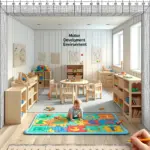In the journey of parenting, encountering developmental challenges in children can be both overwhelming and mystifying.
It is sometimes difficult to live with the uncertainty of a disability in your baby. Childhood illnesses are often not diagnosed at birth; parents often have to see development unfold under their eyes to understand that something is wrong. In many cases it is the mother who realizes that something is not working in her little one. Often it passes from doctor to doctor, but for lack of observable elements the diagnosis is erroneous.
This blog post delves into understanding and nurturing the development of children facing such challenges, particularly focusing on ‘developmental delay‘ and ‘global developmental delay‘. We’ll explore practical and research-backed techniques that can aid in the wholesome development of your child, keeping in mind that these suggestions do not replace professional medical advice.
The path to diagnosing developmental delays in children is often a complex and emotional journey for parents. Signs may not be apparent at birth, and it’s usually through close observation of a child’s development that concerns arise. Often, mothers are the first to notice that something might be amiss. They might consult various doctors, but in the absence of observable symptoms, reaching a definitive diagnosis can be elusive.
It’s essential to remember that the brain, much like a muscle, develops through use and stimulation. Focusing on enhancing certain functions can lead to overall developmental progress. The techniques discussed here are beneficial not only for typically developing children but also for those with developmental challenges. However, if you have any doubts about your child’s development, it’s crucial to consult a pediatrician.
For in-depth techniques and tips, refer to our post on motor development. The strategies outlined there are designed to maximize your child’s brain development.
Importance of Brain Development Opportunities:
The brain develops through the opportunities provided to it. Regularly placing your child on their stomach, under active supervision, can be the first step toward developing motor skills. For a child who struggles with mobility, frequent tummy time is beneficial. If this position is uncomfortable, try using a nursing pillow for support, which can also help keep their airways clear and make the experience more comfortable.
Nurturing through Holding:
Holding your child offers immense developmental benefits. It nourishes the vestibular areas, responsible for significant brain growth. Remember, developing one part of the brain often stimulates overall growth. Additionally, holding your child provides visual stimulation, exposing them to a variety of sights, particularly crucial for children with motor delays who might otherwise experience a limited environment.
Language Development through Interaction:
Holding your child is also an optimal position for language learning. In your arms, your child can see and hear you clearly, making it an ideal time for pointing out and naming objects. This interaction not only aids in language acquisition but also strengthens your bond and provides comfort.
Exposure to Written Language:
Introducing written language early, even as early as one to two years old, can significantly impact cognitive development. Babies are capable of making visual-semantic associations, recognizing words and their meanings. This early exposure enhances memory, concentration, and sets a foundation for learning and reading.
The Key to Happiness:
Finally, it’s important to focus on happiness and well-being rather than solely on ‘normalizing’ development. Normalization doesn’t always equate to happiness. Many individuals are functionally ‘normal’ yet struggle to find happiness.
Conclusion :
Every child’s development is unique, and as parents and caregivers, our role is to provide them with love, support, and the right opportunities to thrive. Remember, the goal is to nurture a happy, healthy child, not just to meet developmental milestones. If you found this information helpful, share it with others who might benefit from it, and don’t hesitate to reach out to professionals for guidance and support. Stay tuned for more insights and tips on nurturing your child’s development.




